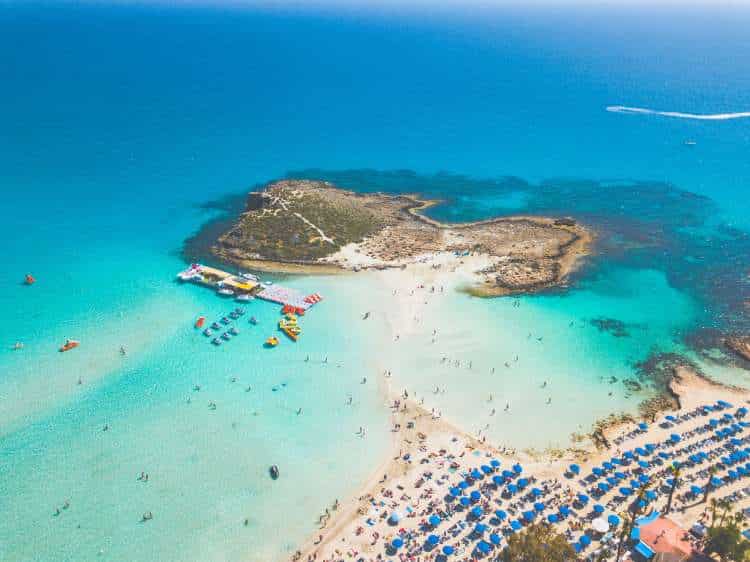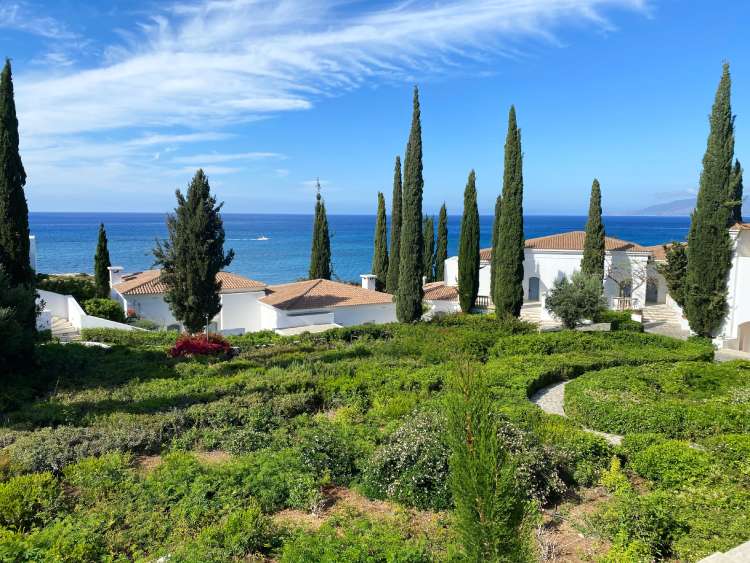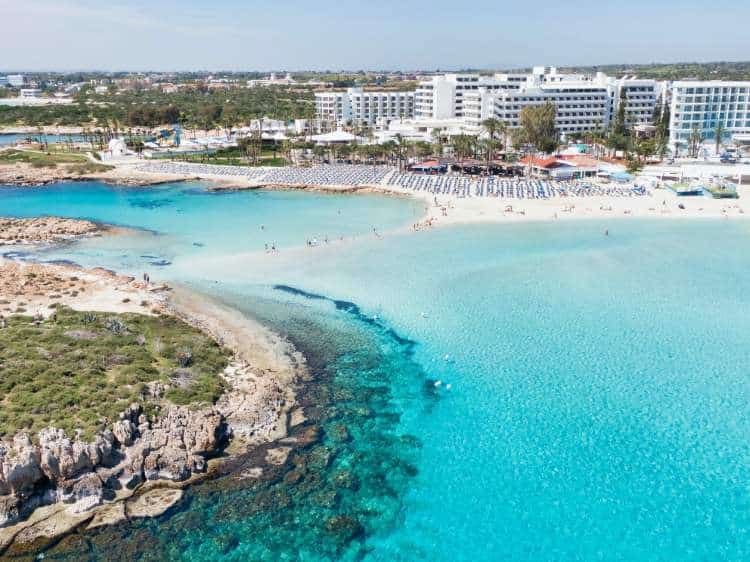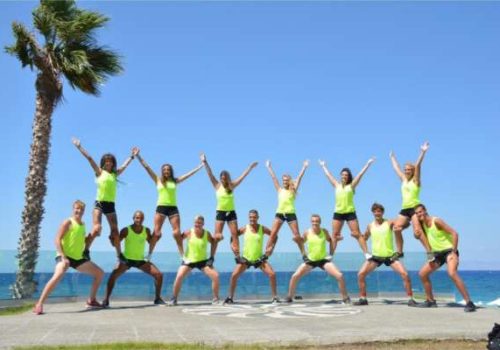Living and Working in Cyprus
Information & guidance about seasonal jobs in Cyprus
Seasonal jobs in Cyprus
- Hotel jobs, Tourism
- Cyprus, Greece, Spain
- Tourism
- Cyprus, Greece, Spain
- Hotel jobs, Tourism
- Cyprus, Greece, Spain
Are you a sun enthusiast? Then the adventure of living and working in Cyprus might be just for you! This island in the Mediterranean is situated between three different continents: Europe, Asia, and Africa. As a result, the island hosts a diverse mix of cultures and groups. When working in Cyprus, you’ll quickly learn about various cultures and lifestyles.
Cyprus is divided into two parts: a Greek part and a Turkish part. This division is because the island partially belongs to Greece and partially to Turkey. Thanks to this cultural blend, the cuisine is particularly intriguing. You can savor various Turkish and Greek delicacies, as well as unique combinations of the two. Definitely worth a try! Keep reading to discover more about life in Cyprus.
Working in Cyprus
Working Conditions in Cyprus
Work conditions in Cyprus typically involve a standard 38-hour workweek spread across 5 workdays. Employees generally enjoy between 20 and 24 annual leave days. Cyprus observes 10 fixed public holidays during which government agencies, banks, and offices are closed. Usually, shops are also closed, although this may vary depending on the holiday. Additionally, there are holidays exclusively celebrated in the northern and southern parts of Cyprus.
Salaries in Cyprus
The average worker in Cyprus earns a gross monthly salary ranging from €966 to €3654. For instance, an accountant on Cyprus typically earns around €2561, a waiter €1095, a nurse €3249, and a teacher €2350 per month gross.
Income Tax in Cyprus
When you choose to live and work in Cyprus, you’ll benefit from low income tax rates. Cyprus operates a progressive tax system, meaning that the more you earn, the higher the tax rate. If your annual income is €19,500 or less, you’re exempt from paying income tax. For those earning between €19,501 and €28,000 annually, the income tax rate is 20% on your taxable income. When your salary falls between €28,001 and €36,300, the rate is 25%, and it increases to 30% for annual incomes ranging from €36,001 to €60,000. For salaries of €60,001 and above, the tax rate is 35%.
Work Culture in Cyprus
In the context of work culture in Cyprus, three key points play a significant role: personal trust, hospitality, respect, and punctuality. While businesses in Cyprus can be quite hierarchical, Cypriots place a high value on personal interactions and building strong relationships with colleagues. It’s not uncommon to have a coffee or lunch together, as this helps people get to know each other better. Always address your colleagues by their last name until instructed otherwise.
Furthermore, punctuality is highly emphasized in the workplace. Strive to be on time for work consistently. Cypriots also prefer to arrange and plan their meetings well in advance.

Holiday Work in Cyprus
The stunning island of Cyprus is a sunny paradise that attracts tourists year-round, not just during the summer season but also in winter. This is because it features a ski resort called Troodos – Mount Olympos with a total of 4 kilometers of slopes. Cyprus offers numerous opportunities for a holiday work. You can find roles as a waitress, entertainer, tour guide or a promoter. There are also positions available as a ski instructor or receptionist.
Do you want to experience the ultimate holiday feeling, explore beautiful Cyprus, gain work experience, and earn money? Then holiday work in Cyprus is perfect for you!
Volunteering in Cyprus
If you’re looking to work abroad during your gap year, volunteering is another option to consider. So, what’s the deal with volunteering in Cyprus? The Red Cross is highly active on the island, offering assistance to those in need. They work closely with volunteers and are constantly on the lookout for new people to strengthen their team.
Moreover, there are various projects related to animals, such as sea turtles. If you’re an animal lover and you’re heading to Cyprus, there are certainly projects where you can lend a hand. Check out the Red Cross website for more information on the possibilities.
Job Opportunities in Cyprus
For an overview of all our job opportunities in Cyprus, from holiday work to permanent positions, feel free to browse through our job listings.
Living in Cyprus
Benefits of Living and Working in Cyprus
Living and working in Cyprus is ideal for those who love the outdoors. Cyprus offers a delightful Mediterranean climate with warm summers and mild winters. Moreover, the island boasts beautiful nature with a rich diversity of animals and plants.
Another significant advantage is the relatively low cost of living in Cyprus. This makes the island attractive to those seeking an affordable place to reside and work. Cyprus also has a favorable tax system for expats and foreign entrepreneurs, making it advantageous for those looking to start their own businesses.
Furthermore, Cypriots are known for their hospitality, warmly welcoming visitors to their beautiful island, whether they are temporary vacationers or expats. The rich and diverse culture, influenced by the Middle East, Greece, and Turkey, makes Cyprus a highly interesting country. There are numerous opportunities to immerse yourself in the local culture and get to know it.
Accommodation in Cyprus
If you’re searching for a comfortable and affordable place to live in Cyprus, you can choose to rent an apartment or house. You can contact a real estate agent to inquire about available apartments or directly get in touch with the apartment owners. Several websites list rental apartments in Cyprus, where you can filter by region, size, and price. We recommend checking out the following websites:
Moreover, there are Facebook groups where apartments and houses are advertised. By joining the following Facebook groups, you can stay updated:
- Rent Cyprus House/Apartments/Flats
- Houses & Flats to Rent & Buy in Cyprus
- Properties In Cyprus for Sale Or Rent
Where to Stay in Cyprus?
The popular cities of Limassol, Larnaca, Nicosia, and Paphos are great places to live. These cities are centrally located, making it easy to explore various attractions on the island. Additionally, the coastal town of Ayia Napa is perfect for those who enjoy nightlife. It is known for its vibrant nightlife with numerous nightclubs and over 80 bars to choose from.
Below are the average monthly rental prices for a 1-bedroom apartment in the city center of different cities in Cyprus:
- Limassol – average of €1383 per month
- Larnaca – average of €839 per month
- Nicosia – average of €605 per month
- Paphos – average of €669 per month
- Ayia Napa – average of €500 per month
Public Transport in Cyprus
Cyprus has a well-developed public transportation system, including trains, planes, and buses. Buses are the primary mode of transportation on the island, with frequent connections between major cities and towns. There is also a train service between Nicosia and Limassol, though it is limited, with only a few trains running each day.
Traveling by public transport in Cyprus is easy and affordable, with a single ticket costing €2, available from various sales points and through the Pame Mobile App.
Despite the extensive public transport system in Cyprus, the distances are quite substantial, and public transport doesn’t reach every corner of the island. If you want to truly explore Cyprus, it’s recommended to rent a car. Ensure you rent your car from a reputable and reliable car rental company, and check the rental terms and conditions.
Consider looking at the Sunnycars website, where you’ll always pay an all-inclusive price, avoiding unexpected surprises upon returning the rental car.
Alternatively, you can explore the island by taxi, with a starting fare of €3.75 and a taxi rate of approximately €1.25 per kilometer.

Eating in Cyprus
Cypriots have a passion for good food, and the country boasts a diverse cuisine influenced by Greek, Turkish, and even Arabic flavors. Cypriots use a variety of spices and fresh ingredients, and they enjoy a hearty breakfast. A typical Cypriot breakfast includes fried or scrambled eggs, bacon, halloumi cheese, and olives, often served with a soup.
For dinner, Cypriots prefer mezes, a table filled with small dishes that can be shared with friends and family. These small dishes may include olives, grilled halloumi, calamari, meatballs, and eggplant puree.
Other typical Cypriot dishes include paidakia (lamb chops), stifádo (beef with onion), and suvla (Cypriot-style Greek souvlaki). For vegetarians, it might be challenging to find suitable dishes in Cyprus, as Cypriots have a penchant for meat. Wine and beer are commonly enjoyed with meals. Did you know that Cyprus produces a variety of wines? Consider visiting a winery or vineyard to taste Cypriot wines. Ouzo, the famous Greek aniseed drink, is also popular in Cyprus.
Nightlife in Cyprus
Cyprus is a paradise for party enthusiasts, with a diverse range of nightlife options. Especially in tourist destinations and major cities like Ayia Napa, Limassol, Nicosia, and Paphos, you can enjoy vibrant nightlife. Ayia Napa, in particular, is often referred to as the “second Ibiza.” For the best nightlife spots in Ayia Napa, head to Agias Mavris Street and The Square. During the high season, club entrance fees typically range from 5 to 20 euros per person. In the low season, you can often enter for free. Popular nightclubs in Ayia Napa include Club Ice, Blue Moon Bar, Club Aqua, and Black N White Club.
To experience nightlife in Limassol, visit the tourist zone near the Apolonia Beach Hotel. This area offers a variety of nightclubs, restaurants, and a bustling bar street. The Rumours bar is popular, known for playing mostly hip-hop and R&B music. Breeze Club, located on the beach, allows you to sample various cocktails. The local residents primarily frequent the city center, especially in the Kanika neighborhood, which hosts several charming terraces and bars.
Cost of Living in Cyprus
To give you an idea of the cost of living in Cyprus, we’ve compared Nicosia, the capital of Cyprus, with Amsterdam.
Firstly, rental prices in Nicosia are approximately 58% lower than in Amsterdam. Additionally, restaurant prices in Nicosia are about 26% lower on average than in Amsterdam, and groceries in Nicosia are roughly 13% cheaper.
For a 3-course dinner for two at a mid-range restaurant in Nicosia, you’ll pay an average of about €50, while in Amsterdam, it would cost around €70. A beer in a restaurant in Nicosia typically costs €4, compared to around €5 in Amsterdam. Furthermore, a cinema ticket in Nicosia averages around €10, while in Amsterdam, it’s about €12. You can expect to pay approximately €1.45 per liter for gasoline in Nicosia, compared to around €2 in Amsterdam.
Currency of Cyprus The official currency of Cyprus is the Euro. In the southern part of Cyprus, the Euro is used, but in the northern part of the country, the Turkish Lira is generally accepted. However, Euros are also accepted in the north, so there’s no absolute need to exchange money when traveling to northern Cyprus.
Cyprus’s Landscape and Stunning Nature Inland Cyprus is home to the Troödos Mountains, with Mount Olympus standing as the highest peak at 1953 meters. This area is perfect for nature lovers and hikers. During the summer, it’s a great place to explore with numerous churches, chapels, and monasteries along your hike. In the winter, you can enjoy skiing and snowboarding.
Cyprus also features many beautiful beaches. The most popular one is located in the southwest, near Aphrodite Rock, which is ideal for various water sports. There’s also a sandy beach called Grovenor’s Beach, situated between Larnaca and Limassol, known for its popularity among snorkelers. Windsurfers favor Lady Mile’s Beach, and Mackenzie Beach in Larnaca is perfect for a long beach walk.
Young people like to relax at Louma Beach and Nissi Beach, while those seeking a quieter environment enjoy Pissouri, Green Bay, Coral Bay, and Konnos Bay. Local residents often visit the beaches of Protaras and Fargos.
Things to Do in Cyprus
Ocean Flyer Cruise to the West Coast of Cyprus
Enjoy a 6-hour Ocean Flyer cruise, departing from Paphos, Cyprus’s harbor city. Sail to the stunning west coast of Cyprus, with beautiful bays, sea caves, and sandy beaches. Take a refreshing swim in the Mediterranean Sea or go snorkeling, followed by a delicious onboard lunch buffet.
Visit Kourion
For history enthusiasts, a visit to Kourion is a must. Kourion was an ancient Greek city situated on a cliff by the coast. The site features renowned places like the House of Eustolios, the ancient theater, and the Byzantine basilica. Admire the mosaic floors and stunning views of the Mediterranean Sea.
Larnaca
Larnaca is a tourist seaside town on the southeast coast of Cyprus, perfect for those who want to enjoy the sea and the sun. You can find numerous cozy restaurants, and culture enthusiasts can explore the old Turkish Skala district and the picturesque mountain villages near Larnaca. Moreover, a large salt lake in the west of the town is home to dozens of flamingos in the spring.
Karpas Peninsula
The Karpas Peninsula, a stunning promontory in Cyprus, boasts golden beaches, including the renowned Golden Beach, as well as picturesque villages and rugged hills. It’s a breathtaking slice of nature in Cyprus. Be sure to visit the village of Sipahi and explore the ruins of the church of Agios Filon in the small town of Dipkarpaz.
Nicosia
The capital of Cyprus is a unique city that straddles two nations. In Nicosia, you can stroll along the border between Turkish and Greek Cyprus. It’s also worth visiting the cathedral and the Cyprus Museum, where you can delve into the island’s rich history. Additionally, Nicosia is the perfect city if you have a penchant for shopping.

Healthcare in Cyprus
Healthcare in Cyprus encompasses both public and private services. As a resident of Cyprus, you are entitled to free or subsidized healthcare. Upon your arrival in Cyprus, it’s essential to register for health insurance. You can arrange this through your local District Labour Office on the island. Your type of healthcare card is determined based on your income. For instance, Health Card A grants you access to free healthcare, while Health Card B provides healthcare at reduced costs.
In addition to the public health insurance, you can opt for a private health insurance plan. With private insurance, you can choose from a wider selection of healthcare facilities and hospitals in Cyprus, often receiving quicker service. Sometimes, your employer in Cyprus may provide you with private health insurance, so it’s wise to check before purchasing one yourself.
Visa and Travel Insurance for Cyprus
If you are a citizen of the EU, Switzerland, Norway, Liechtenstein, or Iceland, you only need a valid ID or passport to move to Cyprus. A valid passport is required if you plan to travel between Northern Cyprus and Southern Cyprus. If you intend to work in Cyprus for more than three months, you should register on the island.
Safety in Cyprus
Cyprus is a safe country, with safety risks comparable to those in the Netherlands. However, it’s advisable to be particularly cautious of pickpockets at tourist destinations. This is especially relevant at popular sites like Ayia Napa, Paphos, and the capital city, Nicosia.
Moving to Cyprus: What You Need to Do Register as a Resident in Cyprus
If you plan to live and work in Cyprus for over three months, you must register within four months of your arrival. You can do this at an immigration office in Cyprus. For registration, you’ll need a valid passport or ID, your employment contract, and two passport-sized photos of yourself.
For more information on registering in Cyprus, visit the website of the Civil Registry and Migration Department (CRMD).
Apply for a Tax Number in Cyprus It’s also essential to apply for a tax number in Cyprus. Start by filling out this form. Subsequently, email this form and a copy of your CRMD registration certificate to one of the following email addresses:
- Nicosia: lefkosia@tax.mof.gov.cy
- Limassol: lemesos@tax.mof.gov.cy
- Paphos: paphos@tax.mof.gov.cy
- Larnaca: larnaca@tax.mof.gov.cy
- Famagusta: ammoxostos@tax.mof.gov.cy
A representative from the tax office in Cyprus will then get in touch with you either by phone or email to provide you with your tax number.





